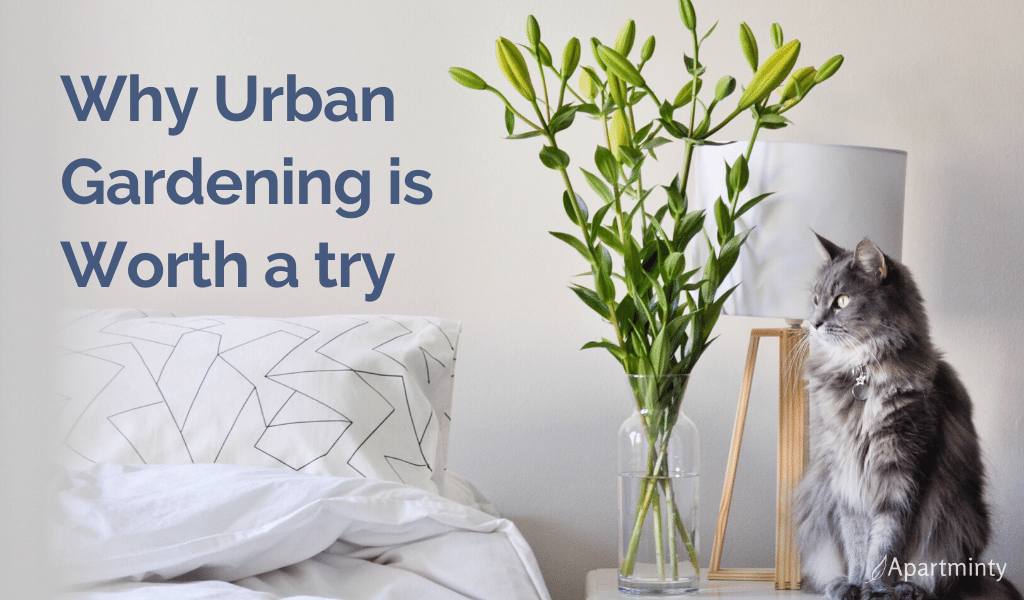
Guest Post
Why Urban Gardening Is Worth a Try
There’s something therapeutic about digging in the dirt, pulling weeds, and watching the garden that you’ve carefully cultivated thrive and grow. Gardening is a beneficial and enjoyable activity in any setting, and just because you live in an urban area doesn’t mean that you have you let your gardening hobby go. In fact, gardening can be highly beneficial to not just your own health and happiness, but it’s great for urban areas as well.
Urban gardening utilizes creative and innovative solutions, including greenhouses, rooftop gardens, container patio gardens, and indoor garden options, too. It can help improve air quality within the city, and brings some green life to the otherwise concrete jungle. You can — and should — pursue your gardening pastime in an urban setting and enjoy the many benefits that your garden will provide for you and the city around you.
Improve City Air Quality
Larger-scale urban gardening efforts can have a direct impact on the air quality in cities. A study published in the Environmental Science & Technology journal reported that trees, bushes, and greenery that grow in cities have a greater capacity to help clean city air than previously believed.
The study measured concentrations of nitrogen dioxide and microscopic particulate matter in the city streets. Both of these elements can harm human health and are commonly found in unsafe levels in city air. Previous research found that while trees and plants can remove these elements from the air, they only removed about 5% of the elements, a relatively small improvement.
According to this new study, strategically placing grass, climbing ivy, and plants in city streets where air is relatively stagnant can reduce nitrogen dioxide by up to 40% and can remove up to 60% of the microscopic particulate matter from the air. By planting large volumes of grass, ivy, and other plants, cities could improve their air quality and contribute to better health for all city residents.
Reduce Fuel Consumption
Growing crops in urban settings also eliminates the fuel consumption and emissions that are associated with transporting food from farms to stores, then again to the consumer’s home. Because homegrown food doesn’t need to be transported, you prevent the need for crates and packing materials, keeping those materials out of already crowded landfills and creating less waste.
With your food growing right in your home, you can pick crops when they’re ripe, enjoying food that’s fresher than what you could buy at a grocery store. If you decide to grow an herb garden, you can conveniently pick fresh herbs to add a little extra flavor to the dishes you cook, all without having to travel for it.
Foster Urban Community
With the hustle and bustle of an urban environment, connecting with your neighbors and overall community can be hard. Not feeling like you’re a part of a community can be isolating and cause depression, and city life, in general, can cause everyone stress. Studies have shown that gardening over the course of a 12-week period can help to relieve both stress and depression symptoms. In another study, participants who spent 30 minutes a day gardening experienced a drop in their levels of cortisol, a hormone that the body releases when under stress. Those study participants also experienced improved moods. With these benefits, starting a community garden with your neighbors could be beneficial to all who want to participate.
For increased stress relief, consider creating a serenity garden for you and your neighbors to share. A serenity garden is a carefully designed space where you can go to spend some quiet time and reflect on life. Choose green and white plants, which are associated with calmness, or pastel-colored plants to create a restful mood. Include a bench, a water fountain, and any other elements that you find calming and reassuring to make yourself a little haven right within your urban setting.
Gardening is accessible to just about everyone, including seniors and people with limited mobility, so anyone can enjoy the meditative and anxiety-relieving properties of working in a garden. Kids can learn about gardening from a young age, establishing their enjoyment of an activity that they can participate in their whole life. Even nurses and healthcare organizations recognize the stress-reducing benefits that activities such as gardening provide.
Even if you don’t have access to an area like a rooftop to cultivate an outdoor urban garden, you can grow plants inside your living space and then share your bounty with your neighbors. By finding the right plants for the direction your window faces, you can enjoy better indoor air quality, fresh herbs for cooking, and all of the stress-reducing benefits of gardening right inside your home while being able to make small connections with neighbors.
Enjoy Personal Health Benefits From Gardening
Urban environments can be stressful, especially for those who have moved into these areas from smaller towns. In addition to providing benefits to the area around you, you will make your time in an urban environment more pleasant by gardening. Plants provide many health benefits to those who surround themselves with them. Plants can make people feel happy and increase productivity. The act of gardening can provide a full-body workout that contributes to upper and lower body strength. Gardening helps to keep your joints and back supple, which can help to prevent arthritis. Regular gardening sessions also give your heart a cardio workout, contributing to its overall health.
When you’re working on an outdoor garden, you’ll spend time in the sun and will give your skin the chance to absorb some vitamin D. Vitamin D can promote calcium absorption, reduce your risk of developing cancer, and improve your immune system.
Plant-derived products like hemp seed oil and CBD offer valuable health benefits like skin nourishment and pain relief. You can also grow plants like aloe, using the plant’s gel to treat burns.
You can also try growing your own food in your indoor garden. There are lots of herbs, vegetables, and fruits that can thrive indoors or in small spaces. Though not a plant, mushrooms are also perfect additions to urban gardens. Using ready-made mushroom kits, you can grow different species of mushrooms in your kitchen or in a humid part of your home.
Starting some agriculture projects within your neighborhood can have wonderful benefits to your community and the city as a whole. From improvements to air quality to fostering connections within your community, gardening will prove to have a positive impact on an urban environment. Look into how you can start an agricultural endeavour, no matter how big or small, in your community today.
GUEST BLOGGER

Adrian Johansen
Writer
Adrian Johansen writes in order to focus her thoughts on all the things she learns every day! If you want to check out more of her writing, you can find her on twitter